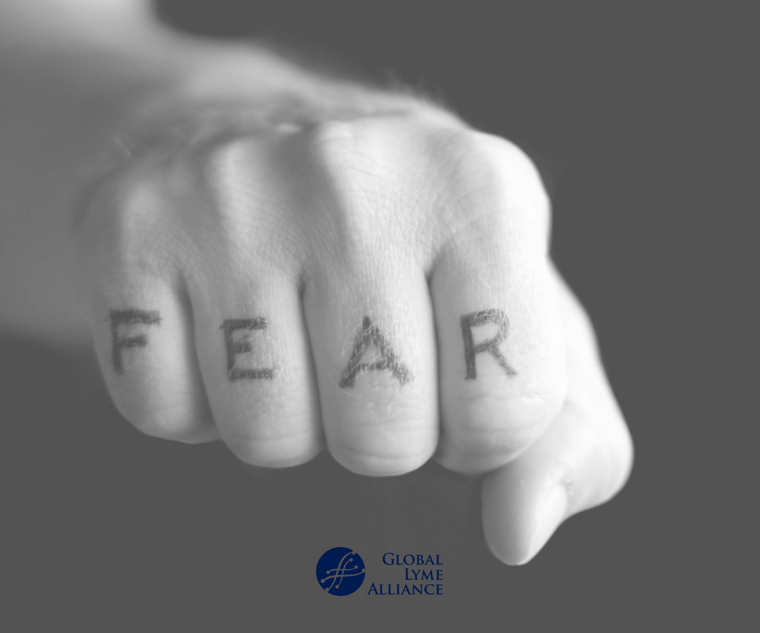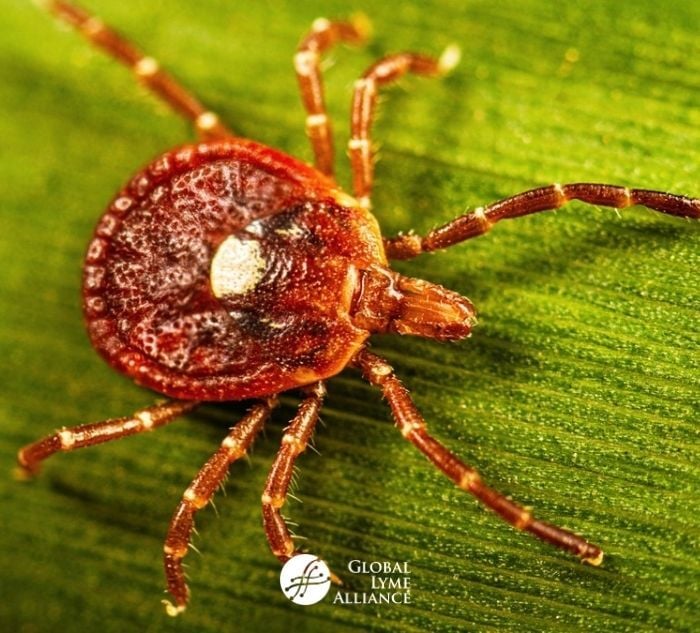
by Jennifer Crystal
Last week I wrote about the well-founded fear of ticks which alarms us every summer, but especially now that infected tick populations are on the rise. Getting a tick bite that could cause reinfection or a new co-infection is a daily concern for me in spring and summer. Fear of relapse is a concern that haunts me year-round. If you aren’t already a Lyme patient, tick season gives you real reason to worry you might become one.
But there are other, broader fears that trouble patients with Lyme or other chronic illnesses, not just during tick season but throughout our medical trajectories, especially when we cannot see the light at the end of the tunnel. They are the deep fears that fester in the pits of our stomachs and worry their way into our anxious minds in the middle of the night. These fears can’t be quelled with bug spray and tick checks, but care for them is equally important, if not more so.
A few years ago, my writing group did a prompt where we each listed our worst fears, and then picked one to write about. I had a hard time picking, because my list was so long. Of course, relapse was at the top. Others included losing the support system I’d worked so hard to gain; losing my mind to brain fog (which I’d gotten back, thanks to antibiotics, but which I knew could slip away again); never being able to fully support myself; being too high-maintenance; never finding a husband who would be willing to deal with my high-maintenance life; wondering if I’d already missed the boat on love, kids, et al.
Group members reminded me how far I’d already come. I certainly hadn’t missed the boat on that; I was just on a different course than most people my age. Just a few years earlier, I would have written a completely different list. Back when I was still bedridden with a PICC line in my arm, my fears were: Will I ever get better? What if I don’t? Am I a burden to everyone around me? How much longer can they put up with me? What if the antibiotics don’t work? What if I’m bedridden fore the rest of my life? What if the naysayers are right and this is all in my head? Will I ever get my life back?
Caretakers of Lyme patients have their own fears. Am I doing enough for my loved one? Too much? Are they going to the right doctor? Taking the right medications? Will they ever get better? What if they don’t? Will I ever get my life back?
Many of my own early fears ended up being unfounded, but I couldn’t have known that at the time, and that’s why they caused anxious thoughts to race through my head. I also had Lyme induced anxiety, caused by Lyme spirochetes affecting my brain, and an overtaxed nervous system. What a toxic combination for a Lyme patient!
But even if they were ultimately unfounded, my fears were valid at the time I had them. The worst thing we can do to ourselves is to judge our own fears and anxieties, and the worst thing we can do for others is to invalidate their feelings. Everyone wants to be heard. It’s very hard to confront a fear if you’re told—by yourself or someone else—that the fear is not valid, just as it’s very hard to treat an illness if you’re told that it doesn’t exist. Validation is the first step in overcoming fear.
The second step, I’ve learned, is that we have to let go of the things we can’t control. This core Stoic conviction is especially hard for someone like me who always wants to have her ducks in a row. But try as I might to plan and control, I really don’t have any say whether some of my fears will come to fruition or not. Sure, are there are tangible things I can do to try to achieve my goals, but I can’t guarantee the outcomes. No one can, and that’s okay. Similarly, there were things I did to help myself get better when I was bedridden: I took all my medications, I went to appointments, I had cognitive behavioral therapy, I followed a strict diet. But in the end, I didn’t have control over how my body would react to antibiotic treatment. I couldn’t plan how long it would take to get into remission, or know if I ever would. The only thing I could do was wait and see, and also have a little hope and faith.
The antibiotics did eventually work. I did go into remission. Then I relapsed, and had to wait an even longer time to get back to remission. Fears followed me through those years, and while they were valid, they weren’t at all helpful. Fear about the unknown can sometimes get to the best of us, and when that happens, the fear itself becomes a roadblock.
Long ago I determined that most of our actions—the way we approach situations, the way we react—are based on either fear or love.
Long ago I determined that most of our actions—the way we approach situations, the way we react—are based on either fear or love. A bully is often mean because he’s afraid of being hurt himself. People hurt their spouses because they themselves are hurting and are afraid to confront that truth.
Therefore, we have a choice. We can let fear run our lives, or we can love our fears as part of ourselves, validate them, and vow to keep going in spite of them. We can choose to hope. We can always choose to have faith that while we don’t know the answers now, eventually some answer will come. As the famous quote, often attributed to John Lennon says, “Everything will be okay in the end. If it’s not okay, it’s not the end.”
 Opinions expressed by contributors are their own.
Opinions expressed by contributors are their own.
Jennifer Crystal is a writer and educator in Boston. She is working on a memoir about her journey with chronic tick-borne illness. Contact her at jennifercrystalwriter@gmail.com

Jennifer Crystal
Writer
Opinions expressed by contributors are their own. Jennifer Crystal is a writer and educator in Boston. Her work has appeared in local and national publications including Harvard Health Publishing and The Boston Globe. As a GLA columnist for over six years, her work on GLA.org has received mention in publications such as The New Yorker, weatherchannel.com, CQ Researcher, and ProHealth.com. Jennifer is a patient advocate who has dealt with chronic illness, including Lyme and other tick-borne infections. Her memoir, One Tick Stopped the Clock, was published by Legacy Book Press in 2024. Ten percent of proceeds from the book will go to Global Lyme Alliance. Contact her via email below.






-2.jpg)